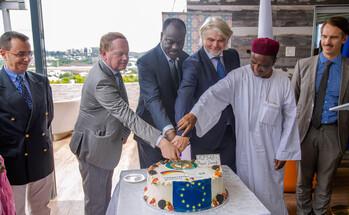Context
The West Africa region is a focal point of old and new forms of armed conflict. This includes violent extremism, organised crime, piracy, unrest due to social inequality, land use conflicts and election-related violence. Many of these security challenges cannot be resolved with national measures alone. They require regional responses, coordinated by the Economic Community of West African States (ECOWAS).
However, ECOWAS faces profound problems in managing threats to peace and security, despite its good political framework documents, existing political efforts and practical experience. These problems affect the ECOWAS institutions, its member states, and civil society organisations in West Africa. In some cases, for example, they do not have sufficient institutional and operational resources to implement political framework documents and strategies for managing conflicts and protecting the populations in a collaborative and coordinated manner.
Objective
The ECOWAS institutions, ECOWAS member states and civil society work in close cooperation to prevent and manage conflicts.
Approach
The project is active in four different areas:
Peace and stability: The project aims to strengthen the ECOWAS mechanisms for promoting and maintaining peace and stability. To this end, it concentrates on improving cooperation between the ECOWAS Commission and regional training institutes and centres of excellence (Kofi Annan International Peacekeeping Training Centre in Accra, École de Maintien de la Paix Alioune Blondin Beye in Bamako, National Defence College in Abuja, Centre de Formation au Déminage Humanitaire in Ouidah, École du Service de Santé des Armées de Lomé). In addition, the project supports the training institutes and centres of excellence in developing and providing needsbased training courses. The aim here is to improve the operational capacity of the ECOWAS Standby Force. In this context, the project also enables closer cooperation between the ECOWAS Commission and the African Union (AU).
Conflict management: At the same time, the project cooperates with civil society organisations and training institutes to strengthen ECOWAS in the implementation of its framework for conflict prevention and its agenda for women, peace and security. This entails, among other things, training in dialogue and mediation skills on the basis of simulations. In addition, the project is setting up national response centres in Togo, the Gambia, Sierra Leone, Guinea and Nigeria to complete the regional early warning system for crises.
Post-conflict environment: With a view to ensuring security also in the aftermath of conflicts, the project works together with think tanks and expert networks to conduct dialogue events and training sessions. These serve to disseminate the framework document on security sector reform and governance (SSRG) in the member states. Moreover, the project supports the ECOWAS Commission in implementing its plans within the framework of SSRG in the Gambia. To this end, it aims to strengthen the national security office and offer dialogue and training opportunities for civil supervisory authorities and institutions.
Electoral processes: In cooperation with the ECOWAS Network of Electoral Commissions (ECONEC), the project organises training courses, studies and exchange, and advises national electoral authorities. Here, it particularly aims to increase the participation of women and young people in electoral processes. The project also supports the ECOWAS Commission in posting experts to member states, advising long-term election observers and improving cooperation between the Commission and member states. In addition, the project advises and trains civil society organisations with regard to conflict prevention in the context of elections, as well as election observation and reporting.
Results
In 2019, consultations were held between the ECOWAS Commission and 210 young peace policy actors from all 15 ECOWAS member states. The results of the consultations were re-flected in the continental study on the role of young people in implementing the youth, peace and security agenda in Africa and in the corresponding AU framework document. Thanks to the two documents, for the first time the AU and ECOWAS have a broadly agreed basis for improv-ing the integration of young people into peace and security processes.
Last update: April 2021
